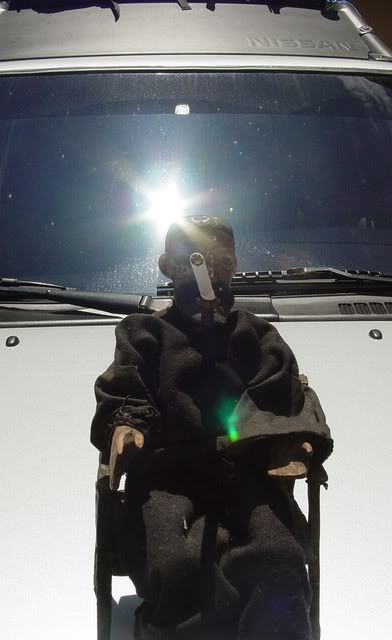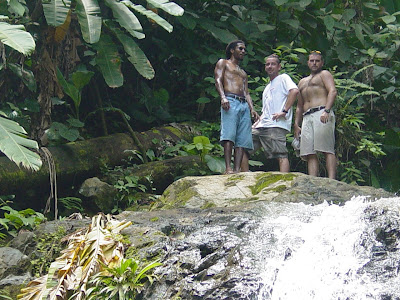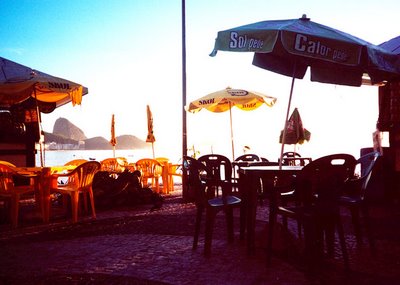On the Road with Evil Gods, Part 1

I was chatting via messenger with Charlie not long ago and he mentioned that, as a result of his kidnapping in Guatemala, he lost his laptop computer and all the photos stored therein. He asked to be sent some photographs of a roadtrip we had taken together. For a moment I was stumped—and then it all came flooding back. “Oh that roadtrip.” Yes, how could I possibly forget? I sent him a few photos and was happy to do it, because the memory of that trip is precious and should never be lost. I pondered it and realized that, perhaps more than all the other Guatemala stories, that particular tale typifies our lives there. It started simply, quickly became a standard Guate mess, and eventually grew into an almost Biblical testing of our limits.
It was also typical in that it began with beer. My friend Jan, pictured below, had run out of Guinness. This is only a minor problem for most people, but at the time Jan owned Reilly's Irish Tavern in Antigua, and since you can’t really call a tavern Irish without serving Guinness, she desperately needed to replenish her stock. But Guatemala had no legal avenues for Guinness importation, which meant the standard restocking technique involved smuggling it in from either Belize or Honduras. Charlie was already in Honduras attending to business at an internet café he owned on the
 Caribbean island of Roatán. Later I would go into business with him myself. If you're curious, click the link at upper right: The Black Pearl Bar. Anyway, word of Jan's predicament traveled the wire and Charlie came to the rescue by volunteering, via an exchange of e-mails, to buy the Guinness and drive it to Copán, on the Honduras/Guatemala border. Jan would send someone to retrieve the beer there and shuttle it back to her bar. The whole operation would take maybe fourteen hours. Easy as pie.
Caribbean island of Roatán. Later I would go into business with him myself. If you're curious, click the link at upper right: The Black Pearl Bar. Anyway, word of Jan's predicament traveled the wire and Charlie came to the rescue by volunteering, via an exchange of e-mails, to buy the Guinness and drive it to Copán, on the Honduras/Guatemala border. Jan would send someone to retrieve the beer there and shuttle it back to her bar. The whole operation would take maybe fourteen hours. Easy as pie.It was at this point that I became involved. I needed to travel to Honduras in an official capacity for my employers Revue magazine. Normally I would have ridden eight hours on a bus, but Jan and Charlie had found a driver for their Guinness caper and suggested I tag along to Copán. The driver would offload me, onload the Guinness, and I would accompany Charlie back to Roatán, which was my ultimate destination. Even with my added presence, this still seemed like it would be easy.
The driver’s name was Eduardo. We left before dawn and chatted while the countryside slid by, morphing from arid highlands to lush farmland broken by verdant forest. We reached Copán at noon, and the first problem arose: Guatemalan shuttle drivers need a special license to cross the border, and Eduardo didn’t have one. He had agreed to risk crossing without a license, and had done so, but Charlie was late, which was the crux of the problem. It meant Eduardo had to mill around in Copán risking police attention. The fine for breaking this strange law would have been enormous by Guatemalan standards, and as time ticked by with no sign of Charlie, Eduardo became more and more nervous. His jitters were compounded by the fact that if he was late leaving Copán, night would fall while he still out in the Guatemalan countryside. Night is when the bandits come out, brandishing their Glocks and Colts smuggled direct from gun shows in Texas and Florida.
Eduardo didn’t wait long. After maybe an hour he got in his van and left. Charlie showed up fifteen minutes later driving his new Nissan Xterra. I’m not sure why he was late, but it may be because when you have a new car you often have an irresistible urge to wander in it, just for the joy of driving. That’s probably why he volunteered to deliver the Guinness in the first place. His tardiness may also have had something to do with the fact that he wasn’t alone. He had brought along his friend John, and they had acquired a Dutch girl named Lea. John, I learned, was a builder on Roatán. He was one of the many American entrepreneurs down there slapping together prefab condos faster than they could be sold, and faster than Honduran authorities could fund environmental impact assessments or file suit to protect ancient, irreplaceable archaeological sites. He was an extremely cool guy with a problematic profession. Lea was less complex—she was your basic European traveler. Anyway, Charlie now had three passengers to drive all the way to the Caribbean, along with the cases of Guinness he had failed to deliver.
 In my travels I’ve found that it’s crucial to get on the road immediately and worry about the details later. If you don’t, you may find yourself delayed for hours looking for gas, snacks, maps, batteries, just about anything, as the day slips away. It’s rule number one for me, and we violated it in Copán, which gave John a chance to browse in a local shop. Being on the receiving end of a Honduran sales pitch is like staring into one of those spiraling hypnowheels used by nineteenth century mesmerists. After a few minutes exposure John emerged glassy-eyed carrying a large statue of Chac, the Mayan god of rain and lightning. It’s hard to imagine a more unwieldy addition to the roadtrip—the god weighed probably seventy-five pounds, took up a lot of space, and needed protection from being chipped or scratched, but simultaneously had to be prevented from crushing delicate camera equipment, laptops, and pressurized Guinness cans.
In my travels I’ve found that it’s crucial to get on the road immediately and worry about the details later. If you don’t, you may find yourself delayed for hours looking for gas, snacks, maps, batteries, just about anything, as the day slips away. It’s rule number one for me, and we violated it in Copán, which gave John a chance to browse in a local shop. Being on the receiving end of a Honduran sales pitch is like staring into one of those spiraling hypnowheels used by nineteenth century mesmerists. After a few minutes exposure John emerged glassy-eyed carrying a large statue of Chac, the Mayan god of rain and lightning. It’s hard to imagine a more unwieldy addition to the roadtrip—the god weighed probably seventy-five pounds, took up a lot of space, and needed protection from being chipped or scratched, but simultaneously had to be prevented from crushing delicate camera equipment, laptops, and pressurized Guinness cans.To add to our worries, we weren’t sure how Chac would mesh with Maximón, another god we were carrying. Maximón is synonymous with the pre-Columbian god of the underworld Maam, who symbolizes chthonic male sexual power, an aspect which leads his devotees to shroud his visage from public view lest his sexuality run rampant. Primarily a bringer of rain and fertility, he is sometimes also called the saint of gamblers and drunkards, and brings wealth and worldly success to those who venerate him. He's also conflated with Judas Iscariot, thanks to hundreds of years of Catholic missionaries campaigning to discourage his worship by associating him with evil. In addition, he has one well-known aspect who is black. Talk about a complex character. Our Maximón, pictured at the top of this post, was a carved wooden idol only a foot high, but like Chac he presented difficulties in terms of transport. He was fragile, and if we broke him we would be fucked, no doubt.
 We managed to get the passengers, the two gods, the cases of Guinness, and our bags and supplies satisfactorily loaded, and set out toward the coast around three o'clock, which was two hours later than we had planned. I mentioned earlier that Charlie owned an internet café. He had built a deck outside this place but hadn’t gotten around to stocking it with deck chairs, so it was providence, certainly, that an hour into the trip we drove by a roadside shack which sold handmade deck chairs. These were good quality chairs, and as you can see from the above photo, because of space constraints could only be strapped to the Xterra’s roof. After all the work of getting them up there I really could have gone for a Guinness, but they were too hot to drink and technically were not ours.
We managed to get the passengers, the two gods, the cases of Guinness, and our bags and supplies satisfactorily loaded, and set out toward the coast around three o'clock, which was two hours later than we had planned. I mentioned earlier that Charlie owned an internet café. He had built a deck outside this place but hadn’t gotten around to stocking it with deck chairs, so it was providence, certainly, that an hour into the trip we drove by a roadside shack which sold handmade deck chairs. These were good quality chairs, and as you can see from the above photo, because of space constraints could only be strapped to the Xterra’s roof. After all the work of getting them up there I really could have gone for a Guinness, but they were too hot to drink and technically were not ours.I may have mentioned in earlier posts that Charlie is the kind of guy who always has multiple demands on his attention, like a juggler with five balls in the air. Whether business dealings or just wild ideas, you’ll never get from point A to point B without detours if he's in charge. So after loading the chairs we were off again, but not to Roatán—not quite yet. Charlie had caught wind of some land for sale way out in the hinterlands and had managed to set up an appointment with a custodian to tour it. First I’d heard of this, but it explained why John was along on the trip. He and Charlie were both planning to take peek at this land. We had a quick lunch at some nameless outpost, then drove up a rutted mud track that snaked through rain forest. The area was deserted save for a few zinc-roofed shacks set back in the trees. We bounced along this mule track, nearly bogging down twice, until at the crest of the road foliage parted to reveal a long, misty valley, green as the greenest emerald, and totally deserted.


 I’ve been lucky enough to see true wilderness several times in my life—swamps, volcanoes, beaches where there were no footprints other than my own—and it’s always an event that stops me cold. It usually takes a moment to realize I’ve stumbled into a place devoid of not only cars, lights and other people, but also the sights common in the National Parks that pass for wilderness Stateside, such as telephone poles, trail markers and garbage cans painted green to blend in with the landscape. When it happens—when you step into true wilderness—it’s a jolt that stabs right to the center of your being. There was nothing in this valley in Honduras—not a thing, just the trees and sky and clouds. I couldn’t believe the place was for sale and it proved, once again, that capitalism is the machine that will destroy the planet. We were quiet in this virgin place, nature’s cathedral, and then we frolicked and explored like children until we were drenched in sweat. Our last act was to climb to the top of a high cascade where the above photos were taken.
I’ve been lucky enough to see true wilderness several times in my life—swamps, volcanoes, beaches where there were no footprints other than my own—and it’s always an event that stops me cold. It usually takes a moment to realize I’ve stumbled into a place devoid of not only cars, lights and other people, but also the sights common in the National Parks that pass for wilderness Stateside, such as telephone poles, trail markers and garbage cans painted green to blend in with the landscape. When it happens—when you step into true wilderness—it’s a jolt that stabs right to the center of your being. There was nothing in this valley in Honduras—not a thing, just the trees and sky and clouds. I couldn’t believe the place was for sale and it proved, once again, that capitalism is the machine that will destroy the planet. We were quiet in this virgin place, nature’s cathedral, and then we frolicked and explored like children until we were drenched in sweat. Our last act was to climb to the top of a high cascade where the above photos were taken.Driving the forest trail back toward the main road we again saw the scattered shabby homes we had passed earlier, and this time we saw the residents themselves. We stopped near one shack in response to a man's gestures. He was carrying a cardboard box. Inside were four baby coatimundi which he offered to sell to us. Coatimundi, for those who don’t know, are carnivores native to Central America, and they have elongated bodies, long flexible snouts, and hooked claws enabling them to hang upside down from tree branches or, potentially, protruding parts of your body. Another characteristic: they don’t like to be confined. I discovered this later.
 We bought two of these little guys, more to save them from the dinner plate than for any need for companionship. After all, how could we need companions when we were already neck deep? There was Charlie and myself, John and the Dutch girl Lea, and the two gods Chac and Maximón. The animals didn’t help with the space situation either, considering we were hauling six deck chairs strapped to the roof, all the luggage and supplies, and those cases of scalding hot Guinness. Yet the poor creatures were stuck with us, though in an effort to escape they were already exploring the structural weaknesses of their cardboard box. It was as if they had caught scent of what was to come. They say animals can sense impending doom—earthquakes and such. They must have known we were headed toward the Caribbean and into a sea of difficulty.
We bought two of these little guys, more to save them from the dinner plate than for any need for companionship. After all, how could we need companions when we were already neck deep? There was Charlie and myself, John and the Dutch girl Lea, and the two gods Chac and Maximón. The animals didn’t help with the space situation either, considering we were hauling six deck chairs strapped to the roof, all the luggage and supplies, and those cases of scalding hot Guinness. Yet the poor creatures were stuck with us, though in an effort to escape they were already exploring the structural weaknesses of their cardboard box. It was as if they had caught scent of what was to come. They say animals can sense impending doom—earthquakes and such. They must have known we were headed toward the Caribbean and into a sea of difficulty.






















1 Comments:
like the new pix. good addition to the blog.
Post a Comment
<< Home